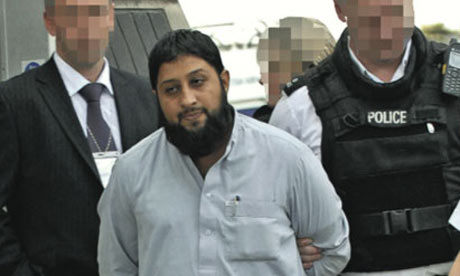MI5 accused of bribe offer in Rangzieb Ahmed torture case
Exclusive: Jailed torture victim says he was offered cash to drop collusion claim
- guardian.co.uk, Monday 6 July 2009 21.00 BST
- Article history

Rangzieb Ahmed arriving at Heathrow from Islamabad: there are questions over MI5's role in his interrogation in Pakistan. Photograph: Dennis Stone/Rex features
The Security Service MI5 is being accused of attempting to pervert the course of justice by offering a man inducements to drop his allegation that its officers colluded in his torture.
Rangzieb Ahmed had three of his fingernails ripped out after MI5 and Greater Manchester police (GMP) drew up a list of questions for officers from a notorious Pakistani intelligence agency who had detained him in Pakistan. He was later deported to the UK and jailed for terrorism offences. Ahmed says he was visited in prison by an MI5 officer and a police officer who offered to secure a reduction in his sentence or a payment of money to withdraw his torture complaints when his appeal against conviction is heard later this year. His lawyers have written to the Crown Prosecution Service to complain that the approach was "grossly inappropriate" and amounted to an attempt to pervert the course of justice.
As well as lodging an appeal against his conviction, Ahmed is also suing the British government for damages arising out of his treatment in Pakistan. It is thought that his lawyers are planning to rely to some extent on a judgment made after legal argument that preceded his trial, the full details of which are being kept secret at the request of MI5 and GMP.
In an interview with the Guardian last week, Ahmed, 33, from Rochdale, says he received a visit at Manchester prison last April from a man in his 40s who identified himself as an MI5 officer, accompanied by a man in his mid-30s who said he was a police officer. "They said they wanted my advice about tackling extremism and then said they could offer me protection if I helped them. Then they said, 'If you withdraw what you are saying about torture, we can make a deal with you to reduce your sentence, or if you want to take money we can give you money.' "
Ahmed's solicitor, Tayab Ali, of the London law firm Irvine Thanvi Natas, said: "Any attempt to conceal evidence of torture would amount, in this case, to an attempt to pervert the course of justice, and I would expect the courts to take a very serious view of the matter."
Asked about the allegation, a Home Office spokesman said: "We don't comment on matters of security. Security service officers act within the law."
Ahmed had been under surveillance in Manchester and Dubai before travelling to Pakistan where he was picked up and tortured by that country's Inter-Services Intelligence Directorate (ISI).
He was deported to Britain 13 months later and prosecuted on the basis of evidence gathered during the surveillance operation. His lawyers argued unsuccessfully that his trial should not proceed because of the torture he had suffered.
Ahmed was convicted of being a member of al-Qaida and directing a terrorist organisation, and jailed for life. What role, if any, MI5 and GMP may have played in his detention is unclear.
The court heard that two British intelligence officers questioned Ahmed while he was in ISI custody, and he says that the signs of the torture he was enduring would have been obvious to them.
The officers would have been operating in line with a government interrogation policy drawn up for MI5 and MI6 officers in the wake of the September 2001 al-Qaida attacks, which permitted them to question people whom they knew were being tortured, and to submit questions to the torturers, as long as they were not seen to condone what was happening.
The existence of the policy remained a secret until earlier this year, when the high court released a transcript of the cross-examination of an MI5 officer who interrogated Binyam Mohamed, a British resident detained in Pakistan in 2002. The attorney general has since called in Scotland Yard to investigate possible criminal conduct on the part of that officer and those who managed him. Last month the Guardian disclosed that Tony Blair knew of the existence of the secret policy. It remains unclear what Blair knew of its consequences, however.
He has been asked repeatedly what role he played in approving it and whether he was aware that it had led to people being tortured. His spokesman responded by saying that he had never authorised the use of torture.
There has been mounting international concern about Britain's involvement in the torture of detainees held by overseas intelligence agencies during the so-called war on terror. Earlier this year Martin Scheinin, a UN special rapporteur on human rights, reported that British intelligence personnel had "interviewed detainees who were held incommunicado by the Pakistani ISI in so-called safe houses, where they were being tortured".

No comments:
Post a Comment